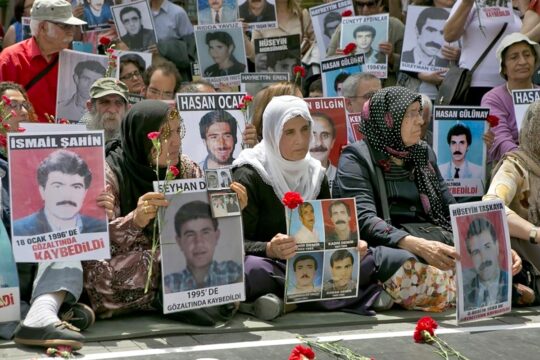An American Christian pastor who has spent the last one and a half years in jail in Turkey strongly rejected terror-related charges on Monday as his trial got underway, in a case that has raised tensions with Washington.
Andrew Brunson, who ran a protestant church in the western city of Izmir, was detained by Turkish authorities in October 2016. If convicted, he risks up to 35 years in jail.
Brunson -- wearing a black suit, speaking in fluent Turkish and at one point bursting into tears -- was present in court in the town of Aliaga north of Izmir for the hearing, an AFP correspondent said.
In an indication of the importance of the case for Washington, also in court were Sam Brownback, the US ambassador at large for religious freedoms, and Senator Thom Tillis.
"I want the whole truth to be revealed. I reject all the accusations in the indictment. I haven't been involved in any illegal activity," Brunson told the court.
"I haven't done anything against Turkey. On the contrary, I love Turkey. I have been praying for Turkey for 25 years," added Brunson, who moved to the country in 1993 and opened his Izmir church in 2010.
Turkish prosecutors have charged Brunson with engaging in activities on behalf of the group led by Muslim preacher Fethullah Gulen -- who Ankara says is behind a failed 2016 coup -- and the Kurdistan Workers' Party (PKK).
Both are banned by Turkey as terror groups. Brunson is also accused of espionage for political or military purposes.
- 'Want him released' -
The Brunson case has further hiked tensions between NATO allies Turkey and the United States, with US President Donald Trump raising the issue in talks with President Recep Tayyip Erdogan.
Relations are already strained over American backing for a Kurdish militia in Syria despised by Ankara and the jailing of two employees at American missions in Turkey.
"That relationship is going to have difficulty in moving forward as long as Andrew Brunson is incarcerated," Brownback told reporters at the courthouse.
He said the whole US administration, from President Donald Trump down, was engaged in the case. "We want to see it resolved and we want to see him released," Brownback added.
In September last year, Erdogan suggested that Turkey could free Brunson if Washington handed over Gulen.
Washington brushed off the offer but has been working intensely to secure the release of Brunson, one of several American nationals caught up in the crackdown after the failed coup against Erdogan in July 2016.
In February, NASA scientist Serkan Golge, a dual national, was jailed for seven-and-a-half years for being a member of Gulen's movement in a conviction denounced by Washington.
Senator Tillis said Monday there was "no deal", adding: "This is about what we believe is an innocent man who has been in prison for a year and a half."
- 'Insult to my religion' -
If convicted, he faces two separate terms of 15 years and 20 years in prison, Brunson's lawyer Cem Halavurt told AFP.
In his statement to the court, Brunson rejected the accusations of links to Gulen's group, saying: "That would be an insult to my religion. I am a Christian. I would not join an Islamic movement."
Gulen, who lives in the US state of Pennsylvania, denies any role in the failed coup and says his Hizmet (Service) movement promotes a peaceful form of Islam.
Brunson also denied aiding any PKK suspects and dismissed as a "lie" suggestions he had preached in favour of Kurdish independence.
His wife Norine, who was detained with him and then released in December 2016, was also present in court for the hearing.
In scenes of heavy emotion, Brunson at one point broke down in tears after greeting his wife and complaining of being tired out by the constant prison transfers.
Numbering just several thousand, the protestant community in overwhelmingly Sunni Muslim Turkey is extremely small, largely comprising converts from Islam, expatriates and refugees.
The Turkish Association of Protestant Churches said in a report that 2017 was marked by continued hate crimes and physical attacks.
Brownback described the trial as a "religious freedom case."
"Turkey, in its history, has been very open so that's one of the things that's really troubling about this," said Brownback.
fo-sjw/pg



